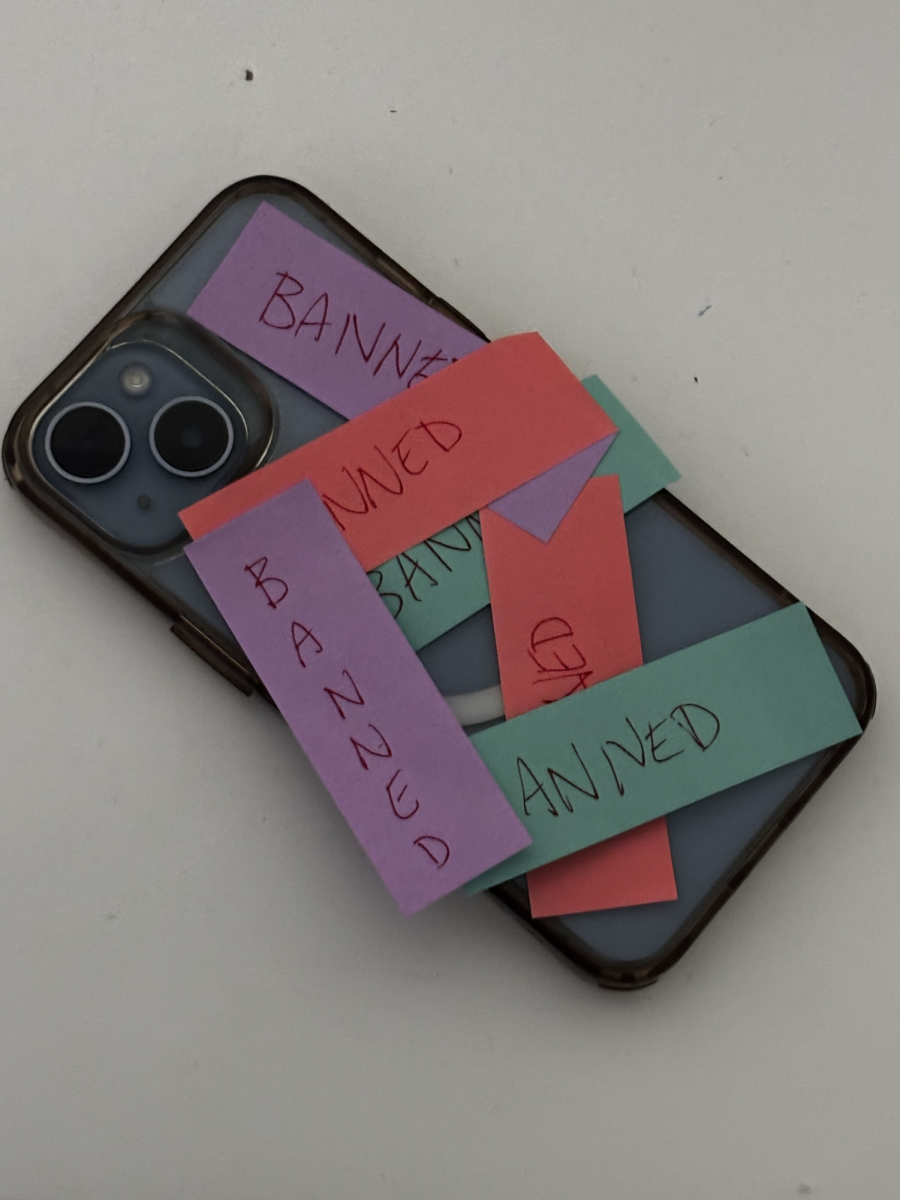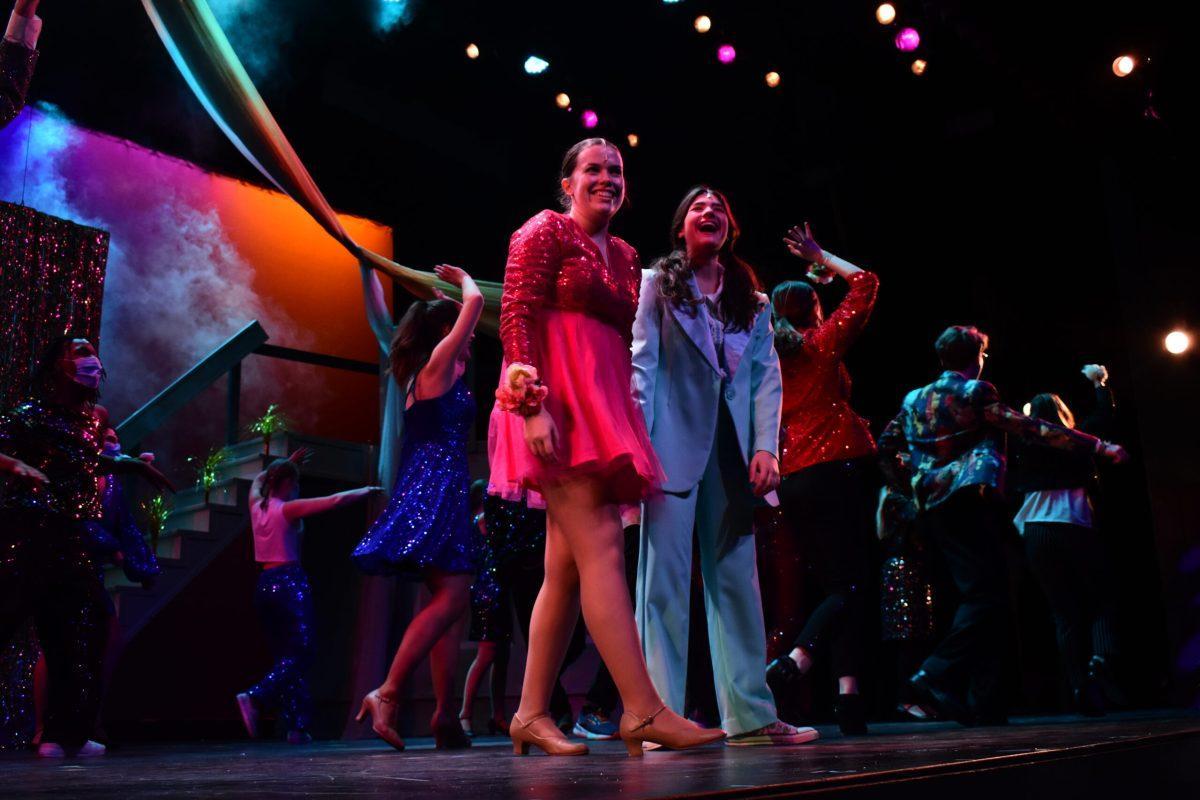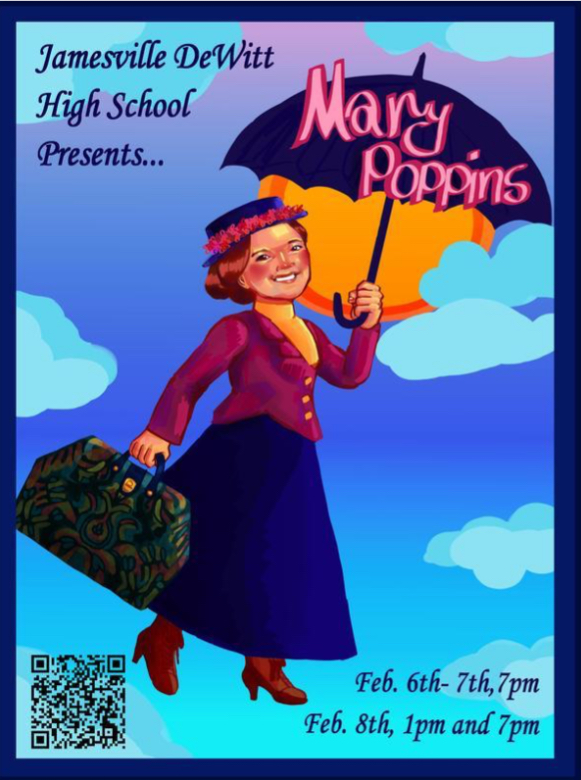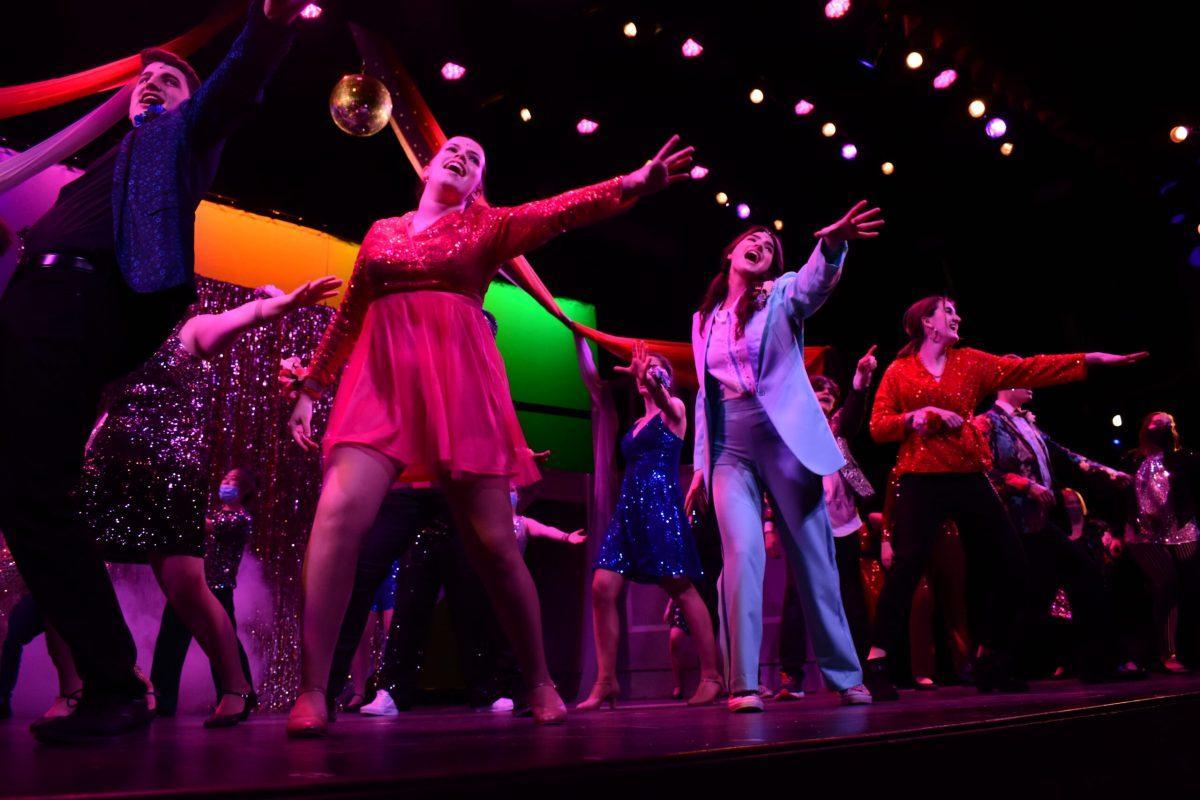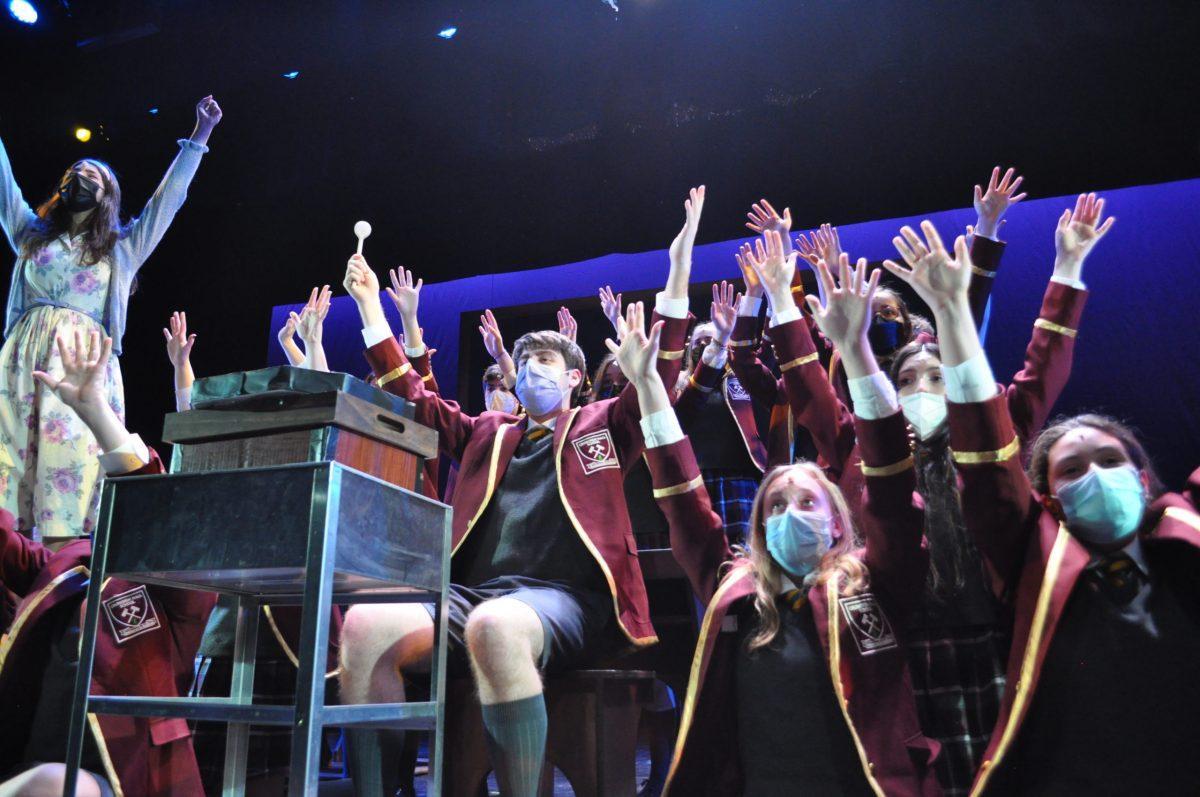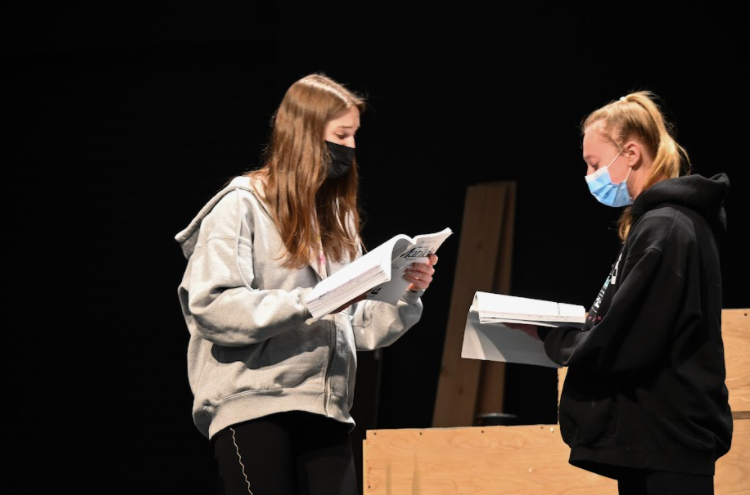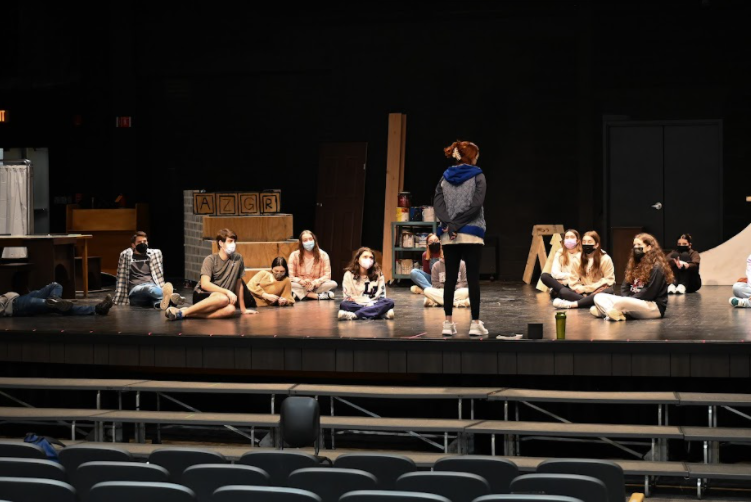With its recent production of “The Prom,” J-D students portrayed the dichotomous themes of bigotry and acceptance. “The Prom” follows a high school girl, Emma Nolan, who faces challenges when she wants to take her girlfriend to her rural Indiana school’s prom. As culturally relevant as the musical is, J-D’s cast members perfectly embodied the high school culture and cliques commonly portrayed in ‘80s movies.
The narrative begins on Broadway, where actors Dee Dee Allen (Nicole Meskos) and Barry Glickman (Thomas Vander Molen) are performing on the opening night of “Eleanor!: The Eleanor Roosevelt Story.” Their performance is trashed in the media because the two actors are narcissistic and are therefore unable to understand their characters. The show closes on opening night, while Dee Dee and Barry team up with fellow actors Trent Oliver (Ethan Millea) and Angie Dickinson (Ava Harle) to promote “a cause” to improve their public image. They find a news story about Emma (Alex Bronchetti), a girl in the town of Edgewater, Indiana, whose prom was canceled by the PTA because she is lesbian.
The audience is introduced to Emma, who experiences severe bullying at high school because of her sexuality. At a PTA meeting, Emma and her principal, Mr. Hawkins (Nathan Warren-Faricy), argue that the prom should be reinstated. Suddenly, the four Broadway actors burst in and declare their misguided support for Emma, reminding the PTA that they are not narcissistic. After the meeting, the audience is introduced to Alyssa Greene (Ella Brann), Emma’s closeted girlfriend and the daughter of the homophobic PTA president. Mr. Hawkins decides to take Emma’s case to the state attorney as a civil rights case. Later, the Broadway actors perform the halftime show at a monster truck rally to support Emma, which backfires when they are ridiculed by the audience.
Mr. Hawkins informs Emma that the state attorney ruled that the school must hold a prom. Emma invites Alyssa to the prom, and she agrees. Meanwhile, Dee Dee goes to Applebee’s with Mr. Hawkins, who is a big fan of her acting. Mr. Hawkins, level-headed and guided by his morals, is unaware of Dee Dee’s narcissism, and the two connect. Barry befriends Emma and helps her prepare for the new prom, and he reveals that he never went to prom.
When Emma arrives at the prom, she finds the gym empty. Inside, she finds a shocked and angry Mr. Hawkins, who informs her that the PTA put on a separate Prom for the rest of the students, and one just for Emma. Dee Dee, also present, complains that this incident will create bad press for her, which angers Mr. Hawkins further. Emma calls Alyssa, who is at the other prom with her mom. Alyssa refuses to join Emma at the fake prom since her bigoted mom is incessantly watching and judging her. Alyssa tells Emma that she had no idea the PTA had planned a fake prom. Emma does not believe her, and she is distraught.
After the fake prom, media coverage of the story increases. The actors encourage Emma to go public with her story, but she replies that she is scared and she just wants to go to prom with Alyssa. Angie tells Emma to “give it some zazz” — to have confidence in herself. Dee Dee enters Mr. Hawkins’s office to apologize, insisting that she will try to become a better person. At the high school, Trent confronts the homophobic students, who tell him that homosexuality goes against their religion. He reminds them that they and their parents go against the Bible every day and to “love thy neighbor,” which convinces many students to accept Emma.
Alyssa apologizes to Emma for staying at the other prom. Alyssa says that her mom puts unbearable pressure on her to be perfect. However, Emma decides that she doesn’t want to have a secret relationship anymore, and she breaks up with Alyssa. In an effort to act selflessly, Dee Dee gives her house in the Hamptons to a TV host to book Emma a TV appearance on short notice, only for Emma to decline the opportunity in favor of her own plan to promote acceptance. Emma posts a video online of her singing with her guitar about her struggles to find acceptance. The video goes viral, and Emma decides to host an inclusive prom for LGBTQ+ kids across the state. However, the school already spent its money on the other prom, and they have little money remaining.
The Broadway actors, now committed to becoming better people, all donate substantial funding for the event. Mrs. Greene is furious with Mr. Hawkins about the idea of another prom, but the students rally behind Emma and apologize for the way they treated her. With many students assembled and her mother present, Alyssa comes out and professes her love for Emma. Mrs. Greene struggles to accept that her daughter is lesbian, and she says they will discuss it later. Barry reminds Mrs. Greene that, if she doesn’t accept Alyssa, she will lose her relationship with her. At the inclusive prom, Emma and Alyssa are finally able to dance together, and they even share a kiss. In a final feel-good moment, an elated Barry wins the title of prom queen.
As I alluded to earlier, I have a few criticisms of the musical in general. While I found J-D’s production to be nearly flawless, several aspects of the musical’s plot were illogical. First, I found it unbelievable that Trent’s song, “Love Thy Neighbor,” was able to instantly eradicate the deep-rooted homophobia present in the Indiana high school. Second, I feel that the cliquiness demonstrated by the cheerleaders and football players is somewhat outdated nowadays. I also feel that the bigotry present in high schools today is less blatant than it seems in the musical. Still, the story is highly compelling, and the audience forms an immediate connection to Emma in particular.
In the Broadway production and the Netflix adaptation of “The Prom,” Mrs. Greene eventually acquiesces and reminds Alyssa that she will always love her. However, J-D’s production omitted this change of heart. I think this was a good decision, as it brought a level of realism back to the musical. To me, Mrs. Greene having such a sudden change of heart would be too good to be true – it would take away from the believability of the musical. Thus, I am glad that J-D’s director of the musical, Kelsie Deyo, decided to leave out this scene.
“Their story deserves to be told.”
-Kelsie Deyo, Director
The J-D Music Department chose “The Prom” precisely for its cultural relevance. In the program for the show, Deyo states, “We chose this show because it explores an LGBTQ relationship, a storyline we have never directly explored on the J-D stage and one that sparked some questions. Was now the time? Would parents and families support it? Would our students take that on? So, after several conversations with the team and district administration, we committed to ‘The Prom.’ Now is always the time for progress, inclusivity, and representation. This story is important. The characters we have gotten to know and explore are beautiful and complex and relevant. Their story deserves to be told. The outpouring of positivity we have received from the J-D families and community is nothing short of amazing, and it has further proven that we made the right choice this year.”
The cast of “The Prom” played their characters adeptly, with the emotion being highly believable. Everything was enjoyable, from the facial expressions, to the accompanying music from the pit band, to the elaborate props, to Meskos’s hilarious portrayal of Dee Dee Allen, to Bronchetti’s prodigious singing ability. I was enthralled by every moment of the musical, and the audience as a whole appeared to react very positively to the musical’s message.
History teacher and musical producer Jordan Berger says, “This cast of students was remarkable. They navigated the storyline with authenticity, dedication, and grace. The cast was incredible in bringing these characters to life and telling this story about acceptance and representation. They worked extremely hard for months learning their music, stage blocking, and choreography to provide a real-life believability to what we see on stage. Not only that, but the pit musicians deserve so much credit for perfecting the instrumental music and the crew worked tirelessly to ensure that the cues were seamless, and the set looked incredible. This was such a team effort [that] brought together 88 students as a family to pull it off!”
The musical accompaniment matched the various scenes very well, but it never overpowered the acting. According to pit band member Alessio Vega, who plays trumpet, “The pit orchestra is always a very special and unique experience. There aren’t too many of us so we get to know each other pretty well. We start off slowly — just a single one-hour rehearsal a week — then we increase it to two a week, then three, until we finally combine with the cast. When we combine with the cast and see everything come together all at once, it’s all incredibly satisfying. It’s also when we have the most fun since we’re all together. But the hours are long — four hours a day for the week and eight hours on Saturdays. But when you spend that amount of time with people, you begin to connect, and we all become friends. It makes the long hours bearable. It’s honestly really beautiful.”
The cast and crew had to contend with a COVID-19 outbreak, among other challenges. “Some initial challenges [involved] the subject matter. We wanted to tell this story of a young lesbian high schooler that wants to bring her girlfriend to prom even though there is pushback from the PTA president and some in the community. It s important to get it right and not have the gay and lesbian characters be simply caricatures that have been repeated in other media forms. We wanted them to feel like real people and I think our students really were up to that challenge. We also had a mini COVID outbreak a week or so before we were set to premiere so we had to take precautions with wearing masks to make sure that we made it to opening night,” says Berger.
“The reception all around school was fantastic and everyone was really supportive of it.”
-Alex Bronchetti (Emma)
Bronchetti says she had fun stepping into the role of Emma. “Overall, I think the musical went really well! The reception all around school was fantastic and everyone was really supportive of it. Also, based on the audience’s reactions every night, it seemed like they loved it! The process of preparing to play Emma was actually difficult for me. I initially felt like I had nothing in common with my character; her lines are things I wouldn’t say and I felt like I couldn’t connect to her. I overcame this by making a playlist of songs I think she’d listen to and writing an entire backstory for her in the first person. This helped me understand what Emma went through prior to the show and put myself in her shoes. I really wanted to make sure my portrayal of her was authentic because I knew that there were going to be people in the audience who would relate to her experiences.”
Thanks to the immense effort, dedication, and long hours of practice by the cast and crew, J-D’s production of “The Prom” was a raging success. The audience at J-DHS was able to connect with the story portrayed on stage, and the message of inclusivity in the musical can serve as a powerful reminder to communities across the country.

